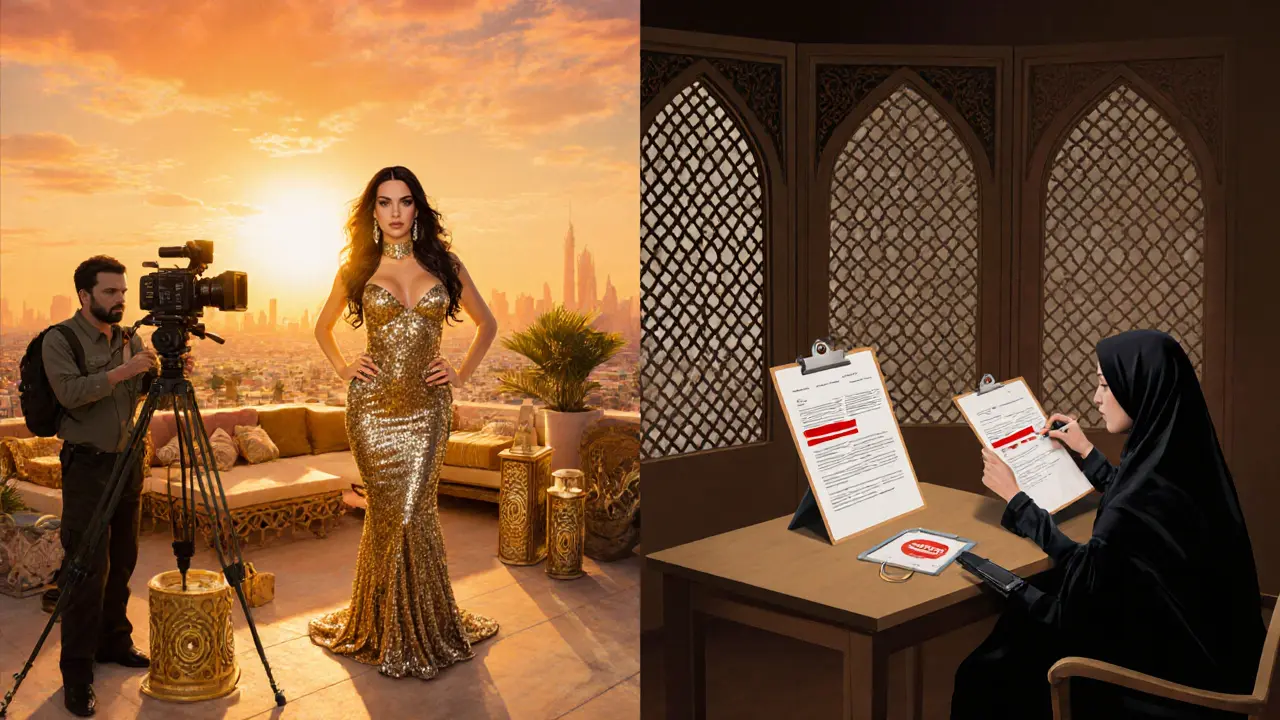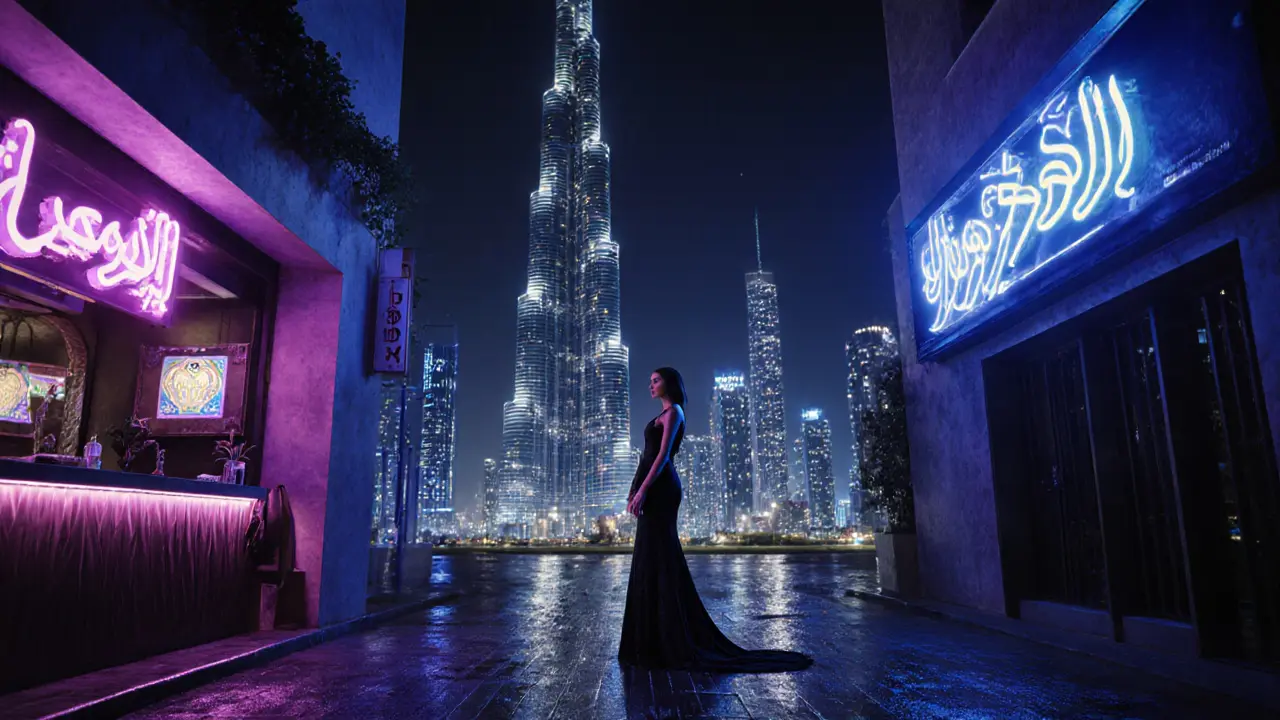When the glitter of skyscrapers meets the intrigue of nightlife, filmmakers love to set their stories in Dubai. But how often do they show the city’s Dubai call girls honestly, and what messages slip through the glossy veneer? This article breaks down the main jobs readers come for: understand the legal backdrop that limits on‑screen sex work, see how Western and local productions differ, spot recurring stereotypes, compare fiction with reality, and glimpse where the narrative might head next.
Legal Landscape and Its Grip on Storytelling
Dubai is a city within the United Arab Emirates, where prostitution is illegal and punishable by heavy fines or imprisonment. Because the law criminalizes the trade, local filmmakers face strict censorship. The UAE Media Regulatory Authority (the body that reviews scripts and final cuts for compliance) often demands that any depiction of sex work be either heavily implied or shown as a cautionary tale.
This legal pressure forces writers to rely on euphemisms-"entertainment companion", "luxury escort", or simply "mystery woman"-instead of naming the profession. As a result, audiences get a clouded picture that blends fact with fantasy.
Western vs. Emirati Productions: A Contrast
Foreign studios, especially those from the U.S. or Europe, can navigate a looser set of rules when shooting on location or using Dubai as a backdrop. They often highlight the city’s reputation as a playground for the wealthy, sprinkling in the trope of the glamorous call girl. Local, Emirati productions, however, tend to either omit the figure entirely or portray her within a moral framework that reinforces traditional values.
| Aspect | Western Production | Emirati Production |
|---|---|---|
| Explicitness | Explicit or suggestive scenes allowed | Implied; rarely shown on screen |
| Stereotype Use | Exoticism, wealth‑driven glamour | Morality tale, cautionary figure |
| Character Depth | Complex backstories, agency highlighted | Often one‑dimensional, linked to crime |
| Setting Realism | Real locations mixed with studio sets | Studio‑bound, limited on‑location shooting |
Examples of Western projects include the 2014 action thriller Fast & Furious 7, which, while not focusing on sex work, features a brief scene where a Dubai call girl is hired by the villain. In contrast, the 2009 Emirati drama City of Life touches on the subject through an indirect subplot, portraying the character as a victim of human trafficking rather than a consensual escort.
Recurring Tropes and Stereotypes
Across both production camps, a handful of clichés keep resurfacing:
- Exoticism: The call girl is framed as a mysterious, almost mythical figure, whose allure stems from East‑West cultural clash.
- Wealth Magnetism: She is often shown as the ultimate status symbol, a prize for the rich expatriate or oil‑magnate.
- Moral Decay: In Emirati storylines, her presence signals societal corruption, reinforcing a narrative that links luxury with loss of values.
- Human Trafficking Victim: Many scripts conflate consensual escort work with forced prostitution, blurring a crucial distinction.
These tropes serve the dual purpose of quick visual storytelling and-sometimes unintentionally-a reinforcement of regional stereotypes about the Middle East as a mysterious, permissive playground for the West.

Reality Check: What Life Is Actually Like for Dubai Call Girls
While the screen often paints a picture of endless parties and high‑paying clients, the ground reality is more nuanced. According to a 2022 research report by the International Association for Sex Workers’ Rights, only a small fraction (about 5%) of sex workers in the UAE operate as independent escorts; the majority are part of informal networks that avoid detection.
These workers face a precarious mix of legal risk, cultural stigma, and limited access to health services. The Dubai Health Authority reports a rising demand for confidential sexual health clinics, yet fear of prosecution keeps many from seeking care.
Films that ignore these nuances end up offering a distorted view, potentially influencing public perception and policy. When a storyline reduces a call girl to a decorative backdrop, it erases the lived experiences of real people navigating a gray‑zone economy.
Audience Impact and Cultural Discourse
Viewers react in two dominant ways. First, expatriates and tourists often interpret these portrayals as a sign that Dubai is a “no‑rules” destination, which fuels a tourism narrative of daring luxury. Second, local audiences sometimes view the depictions as an affront to cultural values, prompting heated debates on social media about the nation’s image abroad.
Social platforms like Instagram and TikTok have seen viral threads where users dissect scenes from Netflix’s Aladdin’s Revenge (a 2023 series that includes a brief, stylized call‑girl scene). Critics argue the series glamorizes illegal activity, while supporters claim it merely reflects a facet of urban life. Such discussions underscore how media can both challenge and reinforce societal norms.

Future Outlook: Streaming, Censorship Loosening, and New Narratives
Streaming giants have begun to test the waters. Because platforms such as Amazon Prime Video and Disney+ operate under different licensing agreements, they sometimes escape the strictest local censorship, allowing more daring storylines. A 2024 pilot titled Desert Shadows is set to portray a Dubai call girl with agency, focusing on her entrepreneurial choices rather than victimhood.
Nevertheless, any production that wants to shoot on location still must obtain a permit from the Dubai Film Commission, which reviews scripts for compliance with the UAE’s moral code. Negotiating these rules often results in scripts being rewritten to replace explicit references with ambiguous language.
As the UAE continues its push for a diversified economy and a broader cultural image, we may see a gradual shift toward more balanced representations-especially if local filmmakers collaborate with international partners who bring nuanced storytelling techniques.
Key Takeaways
- The legal ban on prostitution heavily shapes how Dubai call girls appear on screen.
- Western productions tend to be more explicit and exotic, while Emirati productions often embed moral lessons.
- Common tropes-exoticism, wealth magnetism, and victimhood-oversimplify a complex reality.
- Real‑world data shows a small, hidden workforce facing legal and health challenges.
- Streaming services may drive a new wave of nuanced portrayals, but censorship remains a hurdle.
Frequently Asked Questions
Is prostitution legal in Dubai?
No. The United Arab Emirates criminalizes prostitution, and penalties can include fines, imprisonment, and deportation for non‑citizens.
Which films or series actually feature Dubai call girls?
Few mainstream titles do so openly. Notable examples include the Emirati drama City of Life (2009), which hints at an escort subplot, and the Netflix series Aladdin’s Revenge (2023), which contains a stylized call‑girl scene. Western blockbusters such as Fast & Furious 7 feature a brief cameo.
Why do Western productions portray Dubai call girls differently?
Western studios usually operate under looser home‑country regulations and aim for sensational visuals that attract global audiences. They often emphasize exoticism and wealth, which fits the adventure‑oriented narrative that sells well internationally.
How does censorship affect local filmmakers?
The UAE Media Regulatory Authority reviews scripts before filming. Any explicit reference to prostitution is flagged, forcing writers to use euphemisms or avoid the topic altogether, which limits authentic storytelling.
What’s the outlook for more realistic portrayals?
Streaming platforms, with their different licensing regimes, may allow creators to explore nuanced stories. As the UAE pushes for cultural openness and as international co‑productions increase, we can expect gradual shifts toward more balanced and less stereotyped depictions.

Tiberius Knightley
My name is Tiberius Knightley, a seasoned escort with unparalleled expertise in this thrilling industry. My passion for my profession has led me to explore various cities and cultures as I continue to provide my clients with the best experiences. In my free time, I enjoy writing about my adventures in different cities, focusing on the unique aspects of each place from an escort's perspective. My work aims to not only entertain but also provide valuable insights into the world of high-class companionship. Follow my journey as I uncover the hidden gems and fascinating stories from the cities I visit, all while sharing my expertise in the art of escorting.
view all postsWrite a comment